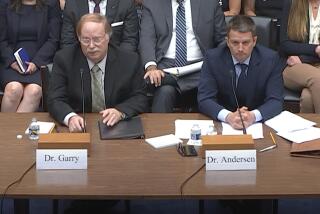Roots of a recession
- Share via
Taxpayers got a three-for-one deal this month from the Financial Crisis Inquiry Commission, the bipartisan task force that Congress empaneled in 2009 to investigate the roots of the financial industry meltdown that helped cause a deep global recession. The commission’s final report offers three different explanations for the crisis: one from its six Democratic appointees and two from its four Republican appointees. In this case, however, more is less -- less clarity and less value to policymakers seeking to avert the next boom-and-bust cycle.
Although the events that led financial markets to freeze are well understood, it was the commission’s job to explain why they happened. Why did risky mortgages and mortgage-backed securities proliferate? Why did so many of those mortgages fail before the economy tanked and millions lost their jobs? Why did the failures cause such havoc on Wall Street?
Instead of reaching a bipartisan consensus, however, the commission’s factions advanced the same dueling narratives that Democrats and Republicans have been spouting practically since taxpayers got dragged into this mess. In particular, they disagreed sharply over the culpability of U.S. regulators and federal affordable-housing policies.
The dissent by Republican deregulation advocate Peter Wallison is easy to dismiss because its premise -- that lenders made bad loans because of pressure from Washington to do so -- runs counter to the facts. The split between the other two camps is more troubling. Both provide compelling insights into the bubble mentality, the weakly regulated mortgage market and the excessively risky investment strategies at many financial institutions. It’s tempting to think they could have produced a definitive, evidence-based explanation that crossed ideological lines, if only they’d had better leadership from Chairman Phil Angelides, the Democrat who once was California’s treasurer, and Vice Chairman Bill Thomas, the Republican former congressman from Bakersfield.
Even with the disagreements among members, their reports reinforce what many analysts have been saying about the crisis and its lessons. Monetary policies designed to spur the economy also promote asset bubbles such as the one in housing, some of which are no doubt being created now. To avoid another catastrophe, policymakers should ensure that investors have better information about risks, that financial institutions do not concentrate too many of their holdings in one sector, and that giant banks can be allowed to sink without pulling down the rest of the industry. Federal officials are working on these types of safeguards now, in accordance with the overhaul of financial regulation enacted last year. Too bad they won’t have a clear, definitive analysis from the commission to guide them.
More to Read
A cure for the common opinion
Get thought-provoking perspectives with our weekly newsletter.
You may occasionally receive promotional content from the Los Angeles Times.









